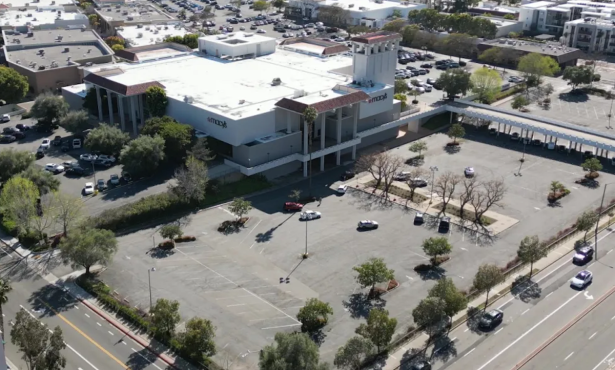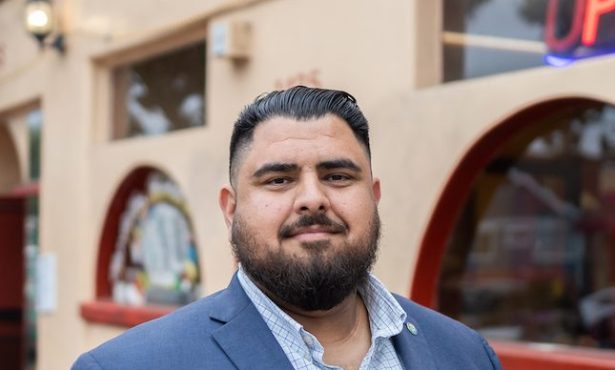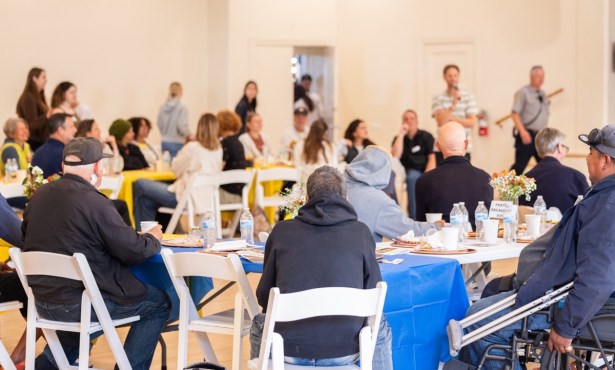Barkin’ Loud, Sayin’ Nuthin’
TERROR BY TEDIUM: It was hardly the trial of the century. It
only felt like it lasted that long. In point of fact, last Friday’s
courtroom proceeding — an institutionally contained spasm of
political perversity — took just six hours start-to-finish. At
issue was the ballot language in support of Measure D 2006, the
proposed quarter-cent increase on an existing half-cent sales tax
that will fund $1.6 billion worth of freeway widening, commuter
rail service, bike lanes, mass transit, road repairs, and more pork
than all the public works directors throughout Santa Barbara County
could ever hope to eat.
As such, it’s what professional public policy analysts refer to
as a win-win-win-win-win scenario. In most places, people would be
satisfied with far less. But this being Santa Barbara — where not
even perfection is ever good enough — it will probably fall short
of the mark. Leading the charge against the ballot language — and
Measure D itself — was Greg Gandrud, the last in a long line of
politicos to emerge from Carpinteria’s unique breeding ground of
contrarian Libertarians. Depending on whom you ask, Gandrud — now
seeking reelection to the Carpinteria City Council — is either an
obnoxious opportunist who alienates friends and invigorates
enemies, or a courageous and creative operator who marches to the
beat of his own drum machine. After enduring last Friday’s
deliberations, I think both are true. Gandrud has been banging the
gong of freeway widening to the exclusion of almost everything else
since coming to office. He is aggressively hostile to the
commuter-rail option — admittedly still a pipe dream — which might
one day alleviate the freeway pain suffered by people who live in
Ventura but work on the South Coast. He’s similarly contemptuous of
bicycle commuting, dismissing it as a nice recreational activity
undertaken by people who like to parade in public wearing brightly
colored garb. In his lawsuit — filed just days before the ballot
statement’s printing deadline — Gandrud charged that the ballot
arguments made on behalf of Measure D were false and misleading. So
too, he claimed, was the ballot summary itself. Given that these
had been signed or approved by the highest ranking elected
officials of our county, he argued, they should be held to a higher
level of accuracy.
In some instances, Gandrud had a point. For example, not all the
money raised by Measure D will be spent in Santa Barbara County, as
arguments in favor of the ballot claim. If the commuter rail ever
gets off the ground, some of the money will have to be spent in
Ventura County, where all the commuters live. But much of Gandrud’s
case consisted of quibbling and hair-splitting. It should also be
noted that some of the claims opponents of Measure D made in their
ballot argument are equally suspect. That may be one reason none of
them joined Gandrud in his lawsuit.
Although an accountant by trade, Gandrud served as his own
attorney, and his lack of knowledge showed. Ever gracious, Judge
Denise de Bellefeuille gave Gandrud all day to make his case. I
found myself yearning for her predecessor, Judge William Gordon,
who knew how to whack a mean gavel. But de Bellefeuille recognizes
the importance of listening.
Consequently, the proceeding was loosey-goosey in the extreme.
However, there were a few moments of genuine courtroom melodrama.
Longtime antagonists had a chance to put each other on the witness
stand and grill away. Eco-attorney Marc Chytilo — representing one
of the many defendants named by Gandrud — got to cross-examine
witness Andy Caldwell, the right-wing, pro-business watchdog who
has opposed virtually everything for which Chytilo has ever stood.
Anti-alternative transportation crusader Scott Wenz — another
non-attorney serving as Gandrud’s co-counsel — got to put Wilson
Hubbell on the Hot Seat. Former director of the county’s
alternative-transportation program, Hubbell was and remains a
die-hard cycling advocate. Just as Caldwell proved slippery on the
stand, so too was Hubbell.
Wenz tried to get Hubbell to admit that bike lanes were a big
waste of money and did nothing to promote bicycle commuting.
Hubbell countered that 5 percent of South Coast residents are
bicycle commuters — a robust figure when compared to other
locales — and added this figure did not include any of the
thousands of UCSB students who rely on the bike as their primary
means of transportation. Gandrud himself got to give the Third
Degree to Jim Kemp, executive director of the Santa Barbara County
Association of Governments and one of the key architects of Measure
D.
But he too came up short. In discussing the commuter rail
option, Gandrud tossed around adjectives like “absurd,”
“ludicrous,” “asinine,” and “ridiculous.” In his courtroom
interlocution, he was desperately trying to pry open Kemp’s lantern
jaw and insert some of those words into Kemp’s mouth. Kemp wasn’t
cooperating, and when forced to answer Gandrud’s yes-or-no
questions, his reply was invariably a clenched “no.” Gandrud got
the last word, I suppose, retorting, “You’re entitled to your
answer, I suppose,” or “You took a long time to come up with that
answer.” Ultimately, the judge ruled against Gandrud on all
counts — as everyone expected — stating he’d failed to meet his
burden of proof. Ever the solicitous jurist, de Bellefeuille did
her best to soften the blow, noting that Gandrud’s burden was
dauntingly high.
Walking away from the courthouse, I was struck most by the sheer
nuttiness of it all. Even though Measure D will allocate $140
million to freeway widening — the thing Gandrud says he wants above
all else — he’s going to oppose it. He wants the whole loaf, not
just a few slices. Not even half. Likewise Travis Armstrong, the
News-Press’s ever-inflamed editorial writer, has made it clear he
will oppose Measure D with his last breath even though it reserves
$126 million for commuter rail — something he has ardently
supported. Why? Travis is always hard to figure, but it has
something to do with the money Measure D reserves for freeway
widening, which Armstrong has adamantly opposed. What’s nutty is
that someone like Gandrud — who went into court so conspicuously
bereft of allies — could kill Measure D.
That’s because it needs a two-thirds supermajority to pass,
making it exceptionally vulnerable to any opposition. Even Travis
Armstrong — whose credibility has plummeted to new depths — could
prove fatal. A two-thirds majority is hard to get. What’s nutty is
that people who stand to benefit from Measure D — it translates, by
the way, to $4,000 per county resident in congestion relief — are
sitting on the sidelines with their hands in their pockets. If and
when Measure D goes down in defeat, it won’t be the end of the
world. But it will probably feel like it. When that happens we can
expect freeway traffic to crawl along even slower than last
Friday’s courtroom theatrics. But no doubt the quarter percent we
saved in tax increases will make it all worth it.



